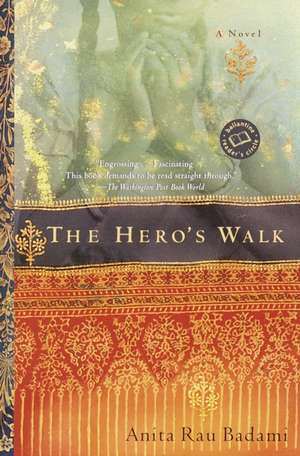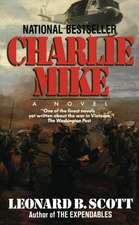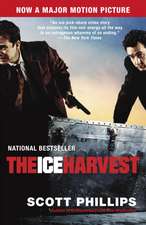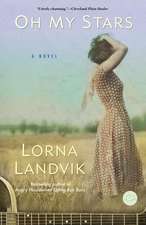The Hero's Walk: Ballantine Reader's Circle
Autor Anita Rau Badamien Limba Engleză Paperback – 31 ian 2002 – vârsta de la 14 până la 18 ani
Vezi toate premiile Carte premiată
Kiriyama Prize (2000)
The Hero’s Walk is a remarkably intimate novel that fills the senses with the unique textures of India. With humor and keen insight, Anita Rau Badami draws us into her story of the graceful heroism of the ordinary.
| Toate formatele și edițiile | Preț | Express |
|---|---|---|
| Paperback (2) | 80.81 lei 6-8 săpt. | |
| Bloomsbury Publishing – sep 2002 | 80.81 lei 6-8 săpt. | |
| BALLANTINE BOOKS – 31 ian 2002 | 109.73 lei 6-8 săpt. |
Din seria Ballantine Reader's Circle
-
 Preț: 97.74 lei
Preț: 97.74 lei -
 Preț: 120.15 lei
Preț: 120.15 lei -
 Preț: 107.27 lei
Preț: 107.27 lei -
 Preț: 121.12 lei
Preț: 121.12 lei -
 Preț: 126.98 lei
Preț: 126.98 lei -
 Preț: 113.15 lei
Preț: 113.15 lei -
 Preț: 115.32 lei
Preț: 115.32 lei -
 Preț: 109.66 lei
Preț: 109.66 lei -
 Preț: 102.38 lei
Preț: 102.38 lei -
 Preț: 129.37 lei
Preț: 129.37 lei -
 Preț: 114.71 lei
Preț: 114.71 lei -
 Preț: 65.81 lei
Preț: 65.81 lei -
 Preț: 116.57 lei
Preț: 116.57 lei -
 Preț: 91.96 lei
Preț: 91.96 lei -
 Preț: 90.35 lei
Preț: 90.35 lei -
 Preț: 120.71 lei
Preț: 120.71 lei -
 Preț: 116.64 lei
Preț: 116.64 lei -
 Preț: 139.70 lei
Preț: 139.70 lei -
 Preț: 110.76 lei
Preț: 110.76 lei -
 Preț: 127.70 lei
Preț: 127.70 lei -
 Preț: 116.55 lei
Preț: 116.55 lei -
 Preț: 112.52 lei
Preț: 112.52 lei -
 Preț: 109.71 lei
Preț: 109.71 lei -
 Preț: 111.51 lei
Preț: 111.51 lei -
 Preț: 111.17 lei
Preț: 111.17 lei -
 Preț: 121.22 lei
Preț: 121.22 lei -
 Preț: 89.48 lei
Preț: 89.48 lei -
 Preț: 106.23 lei
Preț: 106.23 lei -
 Preț: 123.90 lei
Preț: 123.90 lei -
 Preț: 118.73 lei
Preț: 118.73 lei -
 Preț: 126.88 lei
Preț: 126.88 lei -
 Preț: 112.64 lei
Preț: 112.64 lei -
 Preț: 110.96 lei
Preț: 110.96 lei -
 Preț: 128.86 lei
Preț: 128.86 lei -
 Preț: 124.72 lei
Preț: 124.72 lei -
 Preț: 128.86 lei
Preț: 128.86 lei -
 Preț: 122.76 lei
Preț: 122.76 lei -
 Preț: 122.64 lei
Preț: 122.64 lei -
 Preț: 133.06 lei
Preț: 133.06 lei -
 Preț: 132.06 lei
Preț: 132.06 lei -
 Preț: 93.82 lei
Preț: 93.82 lei -
 Preț: 101.06 lei
Preț: 101.06 lei -
 Preț: 85.08 lei
Preț: 85.08 lei -
 Preț: 85.13 lei
Preț: 85.13 lei -
 Preț: 79.16 lei
Preț: 79.16 lei -
 Preț: 88.39 lei
Preț: 88.39 lei -
 Preț: 99.83 lei
Preț: 99.83 lei -
 Preț: 92.83 lei
Preț: 92.83 lei -
 Preț: 87.43 lei
Preț: 87.43 lei
Preț: 109.73 lei
Nou
Puncte Express: 165
Preț estimativ în valută:
20.100€ • 21.92$ • 17.34£
20.100€ • 21.92$ • 17.34£
Carte tipărită la comandă
Livrare economică 15-29 aprilie
Preluare comenzi: 021 569.72.76
Specificații
ISBN-13: 9780345450920
ISBN-10: 0345450922
Pagini: 359
Dimensiuni: 140 x 208 x 21 mm
Greutate: 0.3 kg
Editura: BALLANTINE BOOKS
Seria Ballantine Reader's Circle
ISBN-10: 0345450922
Pagini: 359
Dimensiuni: 140 x 208 x 21 mm
Greutate: 0.3 kg
Editura: BALLANTINE BOOKS
Seria Ballantine Reader's Circle
Recenzii
“Engrossing . . . Fascinating . . . This book demands to be read straight through.”
–The Washington Post Book World
“DEFT AND KNOWING . . . Badami’s prose is lovely, almost poetic, and her ear for dialogue and the idiosyncrasies of her characters’ speech rings true. . . . An intimate look into the hearts and minds of a complicated, quarrelsome, yet deeply loving family.”
–Richmond Times-Dispatch
“COMPELLING . . .[A] LUSH EVOCATION OF INDIAN LIFE . . . [with] often laugh-out-loud funny dialogue.”
–salon.com
“A WONDERFULLY TEXTURED TALE whose poignant events are imbued with truthfulness . . . Badami joins the ranks of such internationally celebrated authors as Michael Ondaaje.”
–The London Free Press
–The Washington Post Book World
“DEFT AND KNOWING . . . Badami’s prose is lovely, almost poetic, and her ear for dialogue and the idiosyncrasies of her characters’ speech rings true. . . . An intimate look into the hearts and minds of a complicated, quarrelsome, yet deeply loving family.”
–Richmond Times-Dispatch
“COMPELLING . . .[A] LUSH EVOCATION OF INDIAN LIFE . . . [with] often laugh-out-loud funny dialogue.”
–salon.com
“A WONDERFULLY TEXTURED TALE whose poignant events are imbued with truthfulness . . . Badami joins the ranks of such internationally celebrated authors as Michael Ondaaje.”
–The London Free Press
Notă biografică
Born in the eastern town of Rourkela, Badami spent her childhood drifting around India as her father, a mechanical engineer and train designer, was transferred frequently. Her family moved at least eight times before she was twenty. Since her parents both spoke different Indian dialects, English was the bridging language for the family. (Badami's second language is Hindi.) The convent nuns who took care of her schooling were not always a receptive audience for Badami's budding literary talents. "Dear child," one of her teachers commented in response to a writing assignment, "what big lies you tell. Please ask your mother to see me." At school the nuns taught Greek and Roman myths, and even Celtic tales. "The only mythology I don't remember learning in school was Hindu mythology," Anita recalls. At home, however, Badami was immersed in the cultures and myths of her family and the multilingual railway workers. This mélange of myths informed Badami's formidable storytelling ability and shaped the exploration of heroism that runs throughout her latest novel.
In 1991 Anita Rau Badami left Bangalore in southern India to join her husband in Calgary, where he went to pursue his Masters in Environmental Science and then to Vancouver for a PhD in Planning. Arriving with their four-year-old son and five hundred dollars, the family was soon ensconced in a depressing basement apartment. To earn money, the former journalist, ad copywriter and children's writer ended up selling china in a mall. Of this time, Badami says, "I learned an awful lot about figurines and place settings, but I also made the most wonderful friends."
Badami began taking creative writing courses and wound up with Tamarind Mem, her master's thesis project at the University of Calgary. She sent the manuscript to Penguin Canada and quickly found herself a bestselling author with a reputation as a talented new Canadian writer. Her stories of home and away, of here and there, made her a part of the tradition Badami refers to as the post-postcolonial-immigrant school that began with Salman Rushdie's Midnight's Children. "I don't think I could have written a novel if I had not left India," Badami said in an interview with The Globe and Mail. "I find that the distance gives me perspective and passion. I was twenty-nine years in India and ten years here, so I have a foot in India and a couple of toes here. I am both doomed and blessed, to be suspended between two worlds, always looking back, but with two gorgeous places to inhabit, in my imagination or my heart."
Just after the publication of The Hero's Walk, Anita Rau Badami won the prestigious Marian Engel Award, given to a Canadian woman author in mid-career for outstanding prose writing. (Previous recipients include Carol Shields, Jane Urquhart, Bonnie Burnard and Barbara Gowdy.) Most recently, The Hero's Walk was optioned for film by a Canadian producer of See Spot Run Films in Los Angeles.
In 1991 Anita Rau Badami left Bangalore in southern India to join her husband in Calgary, where he went to pursue his Masters in Environmental Science and then to Vancouver for a PhD in Planning. Arriving with their four-year-old son and five hundred dollars, the family was soon ensconced in a depressing basement apartment. To earn money, the former journalist, ad copywriter and children's writer ended up selling china in a mall. Of this time, Badami says, "I learned an awful lot about figurines and place settings, but I also made the most wonderful friends."
Badami began taking creative writing courses and wound up with Tamarind Mem, her master's thesis project at the University of Calgary. She sent the manuscript to Penguin Canada and quickly found herself a bestselling author with a reputation as a talented new Canadian writer. Her stories of home and away, of here and there, made her a part of the tradition Badami refers to as the post-postcolonial-immigrant school that began with Salman Rushdie's Midnight's Children. "I don't think I could have written a novel if I had not left India," Badami said in an interview with The Globe and Mail. "I find that the distance gives me perspective and passion. I was twenty-nine years in India and ten years here, so I have a foot in India and a couple of toes here. I am both doomed and blessed, to be suspended between two worlds, always looking back, but with two gorgeous places to inhabit, in my imagination or my heart."
Just after the publication of The Hero's Walk, Anita Rau Badami won the prestigious Marian Engel Award, given to a Canadian woman author in mid-career for outstanding prose writing. (Previous recipients include Carol Shields, Jane Urquhart, Bonnie Burnard and Barbara Gowdy.) Most recently, The Hero's Walk was optioned for film by a Canadian producer of See Spot Run Films in Los Angeles.
Extras
It was dusk by the time they got a bus to the beach. They made their way to the same secluded spot at which they had scattered Maya's ashes. The tide was coming in, curling waves lapped against their feet, and seagulls swooped and pecked at drying seaweed left on the sand. Further down, pariah dogs leapt at an upturned boat, trying to get at something dangling from the high side. Sripathi walked across the wet, squelching sand until he reached the water. With a sense of déjà-vu, he emptied the ashes and watched as they mingled with the waves. Poor Ammayya, what a long, unresolved life she had lived, he thought regretfully.He went back to the cluster of mossy rocks where he had left Arun and sat down beside his son. They stayed there until the moon appeared, a silver semicircle ringed with concentric rainbow light. It would be sunny tomorrow. In the thick darkness the sea was luminous, a body of motion, living, mysterious, beautiful."You go home if you want to, Appu," said Arun, his arms locked around his raised knees on which he rested his chin. "I want to watch the turtles coming in.""How do you know that they will be here today?""A few arrived yesterday and usually the rest follow soon after.""I'll stay with you," said Sripathi after a moment's hesitation. He had lived all his life beside this same sea, and he had never spent an entire night watching it as it poured over the sand and sucked away, leaving a wavering lace of froth that it retrieved almost immediately.The moon rose higher in the sky, the beach emptied slowly, and one by one the last of the vendors turned off their Petromax lanterns and left. Now all they could hear was the susurrating of the wind in the brief stand of palm trees behind them. Suddenly, out of the sea, a dark form detached itself and staggered slowly up the damp sand. And another and another. Dozens of them. No, scores. It seemed to Sripathi that the beach itself had risen up and was rippling away from the water."Can you see them?" whispered Arun. As if the turtles would be scared off by his voice when they carried the thunder of ancient waters in their small, swivelling heads.They poured across the sand, wobbling and swaying, a humpbacked, crawling army drawn by some distant call to the shore on which they were born fifty, one hundred, two hundred years ago, to give birth to another generation. Across the water line they surged, each an olive-green dune in slow motion, until they were well out of reach of the waves. They stopped one by one and began to dig cradles for their eggs-their thick stubby hind legs powerful pistons spraying sand into the air-grunting and murmuring, moaning and sighing as they squatted over the holes and dropped their precious cargo.Arun leaned over and whispered, "Each of them lays at least a hundred to two hundred eggs, Appu."Sripathi nodded, too moved to comment. How many millennia had this been going on? he wondered, humbled by the sight of something that had started long before humans had been imagined into creation by Brahma, and had survived the voracious appetite of those same humans. In the long continuum of turtle life, humans were merely dots.
Soon the turtles were done and began to churn up the sand again, covering the holes, tamping them down tight, with slow, deliberate movements. And then the swaying trudge back to the gleaming sea. Sweeping their hind legs to erase every trace of their arrival, as meticulous as spies in foreign lands."See how cunning they are," whispered Arun again. "They are making sure predators don't find their nests by following their footprints."The last of the turtles disappeared into the waters as silently as they had arrived. They would never see their babies hatch, would not return for one full year to lay another batch of eggs at the edge of the sea that had been there longer than even they had. Their young might live or die. The eggs they left with so much care might yield another generation of turtles-or not. Sripathi thought about the chanciness of existence, the beauty and the hope and the loss that always accompanied life, and felt a boulder roll slowly off his heart.
(c) 2000 by Anita Rau Badami
Soon the turtles were done and began to churn up the sand again, covering the holes, tamping them down tight, with slow, deliberate movements. And then the swaying trudge back to the gleaming sea. Sweeping their hind legs to erase every trace of their arrival, as meticulous as spies in foreign lands."See how cunning they are," whispered Arun again. "They are making sure predators don't find their nests by following their footprints."The last of the turtles disappeared into the waters as silently as they had arrived. They would never see their babies hatch, would not return for one full year to lay another batch of eggs at the edge of the sea that had been there longer than even they had. Their young might live or die. The eggs they left with so much care might yield another generation of turtles-or not. Sripathi thought about the chanciness of existence, the beauty and the hope and the loss that always accompanied life, and felt a boulder roll slowly off his heart.
(c) 2000 by Anita Rau Badami
Descriere
In a small town in India, Sripathi Rao receives a call that his daughter has been killed in an accident in Canada, leaving him to raise her child. This prize-winning novel--replete with the color, customs, and contradictions of India--is imbued with a sense of family life that is universal.
Caracteristici
Anita Desai meets Joanna Trollope. A warm, witty and wonderfully wise novel selected as a WASHINGTON POST BEST BOOK OF THE YEAR.
Premii
- Kiriyama Prize Nominee, 2000











